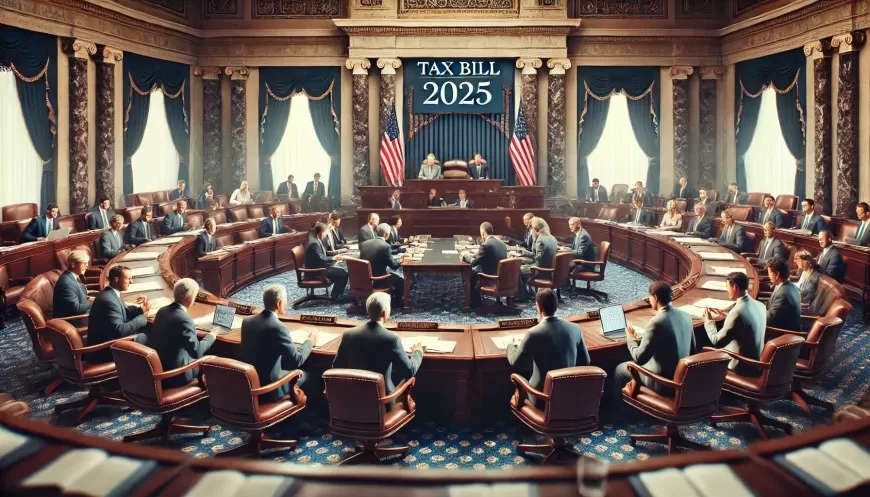2025 Tax Bill Coming Soon: Investors May Have to Wait for Full Details and Clarity
Republicans are planning a 2025 tax bill, but investors may need to wait until late in the year for clear details. Timing and political challenges could delay clarity.

A significant tax bill is expected to be on the table for 2025, but it looks like investors will have to wait until later in the year to fully understand the details. Republican leaders are currently debating how to approach this crucial piece of legislation, and opinions on the timing of the bill’s introduction are split.
Strategic Delays and Political Realities
Senator John Thune, who is slated to become the Senate majority leader, recently indicated a preference for a more measured approach. Speaking in a closed-door meeting with colleagues, Thune suggested that the Senate should first use the reconciliation process to pass a package focusing on border security, energy, and national defense, potentially within the first month of a new Trump administration. The tax bill, he proposed, would be better held off until later in 2025.
While some see this as a practical approach, others worry that waiting could lead to rushed decisions and missed opportunities. Tobin Marcus, head of U.S. policy and politics at Wolfe Research, shared with Yahoo Finance that investors might need to hold off on any clear expectations until the fourth quarter. “Realistically, we’ve always thought that tax policy would be sorted out later in the year,” Marcus noted, pointing out that the December 31, 2025, expiration of 2017 tax cuts is a major deadline driving urgency.
Extending 2017 Tax Cuts and Funding Challenges
The 2017 tax cuts, signed during President Trump’s first term, are set to phase out at the end of 2025. Extending them would come with a steep price tag, estimated to exceed $4 trillion. On top of that, Republicans have to consider the cost of new tax policies and initiatives championed by Trump during his 2024 campaign.
Garrett Watson, a senior analyst at the Tax Foundation, spoke about the challenges on a recent podcast. “The question is whether lawmakers can agree on a budget number that both chambers can support,” Watson said. With such a hefty financial implication, striking a balance that satisfies everyone in the Republican caucus is going to be tough.
Divided Opinions Within the Party
The debate on timing is not just a matter of policy but also politics. Some Republicans, including Rep. Jason Smith, who chairs the House Ways and Means Committee, argue that delaying could backfire. Smith called Thune’s suggestion “reckless,” stressing that waiting until December could increase the risk of tax hikes for Americans.
House Speaker Mike Johnson has yet to weigh in, but he has expressed interest in tackling tax reform during Trump’s first 100 days in office. However, with the House likely to be controlled by just a two-seat margin (217-215) at the beginning of 2025, Johnson will have a difficult task building consensus, especially with members whose priorities range from moderate to far-right.
The complexity of reaching a deal is amplified by the Republican caucus’s diversity. A few dissenting votes could be enough to block a tax package, making it essential for leaders to navigate this process carefully.
The Reconciliation Process and Timing
The reconciliation process, which allows the Senate to pass budget-related bills with a simple majority vote, will play a critical role in moving a tax bill forward. However, the process comes with strict rules and timelines that could push a second reconciliation dedicated to tax policy into late 2025.
Policymakers have to weigh whether pushing ahead quickly would make it difficult to meet the required spending limits and policy objectives. Extending the 2017 tax cuts is a major part of the plan, but additional measures, such as changes to the state and local tax (SALT) deduction, will require attention as well.
What It Means for Investors and the Public
For investors and the public, the uncertainty around tax policy means that planning ahead may be difficult. Changes to the tax code can affect everything from investment strategies to long-term savings, so staying informed on legislative developments will be key. While the outcome remains uncertain, one thing is clear: 2025 will be a crucial year for tax policy, with potential changes that could shape the economy for years to come.
As lawmakers debate the best approach, the need for clarity will only increase as the deadline approaches. The decisions made in 2025 will be significant, and the discussions over the coming months will likely determine the direction of the tax landscape for the near future.
Also Read: Trump’s Tariff Threat and Its Impact on BRICS Pay and the Dollar































































